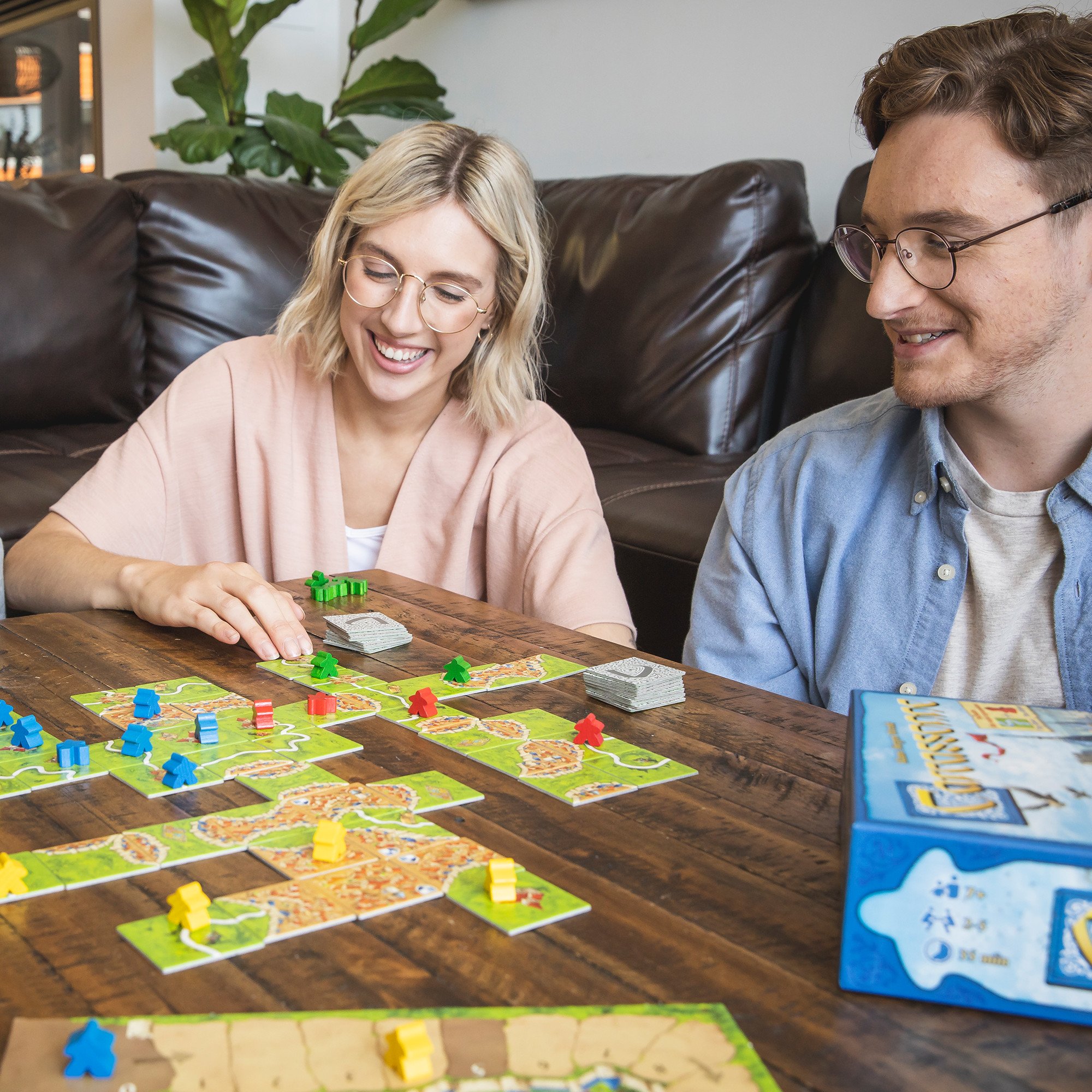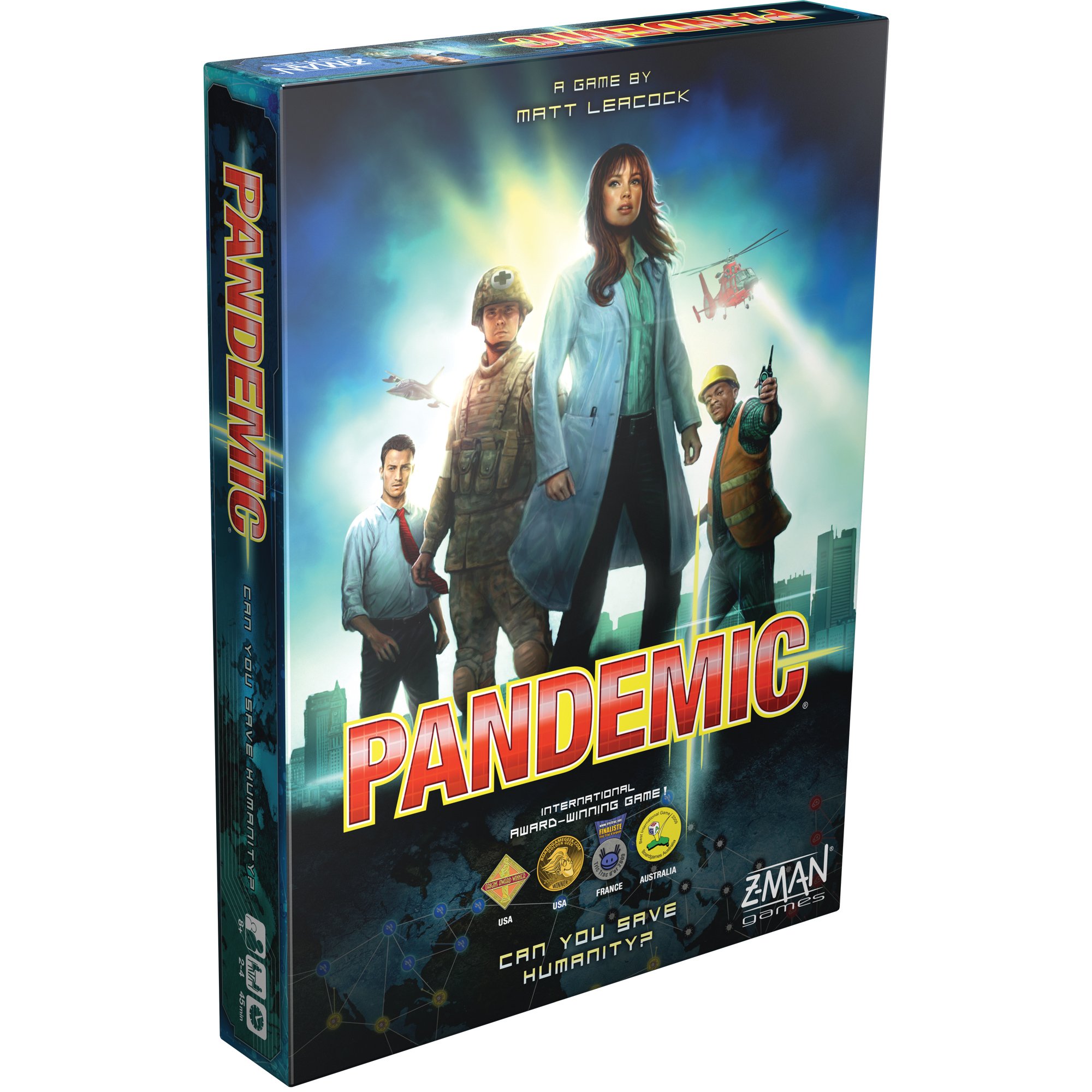Holiday Gift Guide: 2022 Edition
It’s the most wonderful Time of the year
Need some help finding the perfect game this year? Look no further! This list will be updated over the coming weeks for the season, including the hottest new releases and our staff favorites!
The Starting Line
Are you new to Hobby Board Games? This is a great place to start! These games are highly recommended for their broad appeal, popularity, and solid design that have stood the test of time. This line has a variety of styles of games within it, which we will highlight below.
AZUL
2-4 players | 30-45 min | ages 8+
In the game Azul, players take turns drafting colored tiles from suppliers to their player board. Later in the round, players score points based on how they've placed their tiles to decorate the palace. Extra points are scored for specific patterns and completing sets; wasted supplies harm the player's score. The player with the most points at the end of the game wins.
Ticket to Ride
2-5 players | 30-60 min | ages 8+
With elegantly simple gameplay, Ticket to Ride can be learned in under 15 minutes. Players collect cards of various types of train cars they then use to claim railway routes in North America. The longer the routes, the more points they earn. Additional points come to those who fulfill Destination Tickets – goal cards that connect distant cities; and to the player who builds the longest continuous route.
"The rules are simple enough to write on a train ticket – each turn you either draw more cards, claim a route, or get additional Destination Tickets," says Ticket to Ride author, Alan R. Moon. "The tension comes from being forced to balance greed – adding more cards to your hand, and fear – losing a critical route to a competitor."
Catan
3-4 players (5-6 with expansion) | 60-120 min | ages 10+
In CATAN (formerly The Settlers of Catan), players try to be the dominant force on the island of Catan by building settlements, cities, and roads. On each turn dice are rolled to determine what resources the island produces. Players build by spending resources (sheep, wheat, wood, brick and ore) that are depicted by these resource cards; each land type, with the exception of the unproductive desert, produces a specific resource: hills produce brick, forests produce wood, mountains produce ore, fields produce wheat, and pastures produce sheep.
Splendor
2-4 players | 30 min | ages 10+
Splendor is a game of chip-collecting and card development. Players are merchants of the Renaissance trying to buy gem mines, means of transportation, shops—all in order to acquire the most prestige points. If you're wealthy enough, you might even receive a visit from a noble at some point, which of course will further increase your prestige.
On your turn, you may (1) collect chips (gems), or (2) buy and build a card, or (3) reserve one card. If you collect chips, you take either three different kinds of chips or two chips of the same kind. If you buy a card, you pay its price in chips and add it to your playing area. To reserve a card—in order to make sure you get it, or, why not, your opponents don't get it—you place it in front of you face down for later building; this costs you a round, but you also get gold in the form of a joker chip, which you can use as any gem.
All of the cards you buy increase your wealth as they give you a permanent gem bonus for later buys; some of the cards also give you prestige points. In order to win the game, you must reach 15 prestige points before your opponents do.
Carcassonne
2-5 players | 30-45 min | ages 7+
Carcassonne is a tile-placement game in which the players draw and place a tile with a piece of southern French landscape on it. The tile might feature a city, a road, a cloister, grassland or some combination thereof, and it must be placed adjacent to tiles that have already been played, in such a way that cities are connected to cities, roads to roads, etcetera. Having placed a tile, the player can then decide to place one of their meeples on one of the areas on it: on the city as a knight, on the road as a robber, on a cloister as a monk, or on the grass as a farmer. When that area is complete, that meeple scores points for its owner.
Pandemic
2-4 players | 45 min | ages 8+
In Pandemic, several virulent diseases have broken out simultaneously all over the world! The players are disease-fighting specialists whose mission is to treat disease hotspots while researching cures for each of four plagues before they get out of hand.
Dixit
3-8 players | 30 min | ages 8+
One player is the storyteller for the turn and looks at the images on the 6 cards in her hand. From one of these, she makes up a sentence and says it out loud (without showing the card to the other players). Each other player selects the card in their hands which best matches the sentence and gives the selected card to the storyteller, without showing it to the others.
The storyteller shuffles her card with all the received cards. All pictures are shown face up and every player has to bet upon which picture was the storyteller's. If nobody or everybody finds the correct card, the storyteller scores 0, and each of the other players scores 2. Otherwise the storyteller and whoever found the correct answer score 3. Players score 1 point for every vote for their own card. The game ends when the deck is empty or if a player scores 30 points. In either case, the player with the most points wins the game.
Codenames
2-8+ players | 15 min | ages 10+
Codenames is an easy party game to solve puzzles.
The game is divided into red and blue, each side has a team leader, the team leader's goal is to lead their team to the final victory.
At the beginning of the game, there will be 25 cards on the table with different words. Each card has a corresponding position, representing different colors.
Only the team leader can see the color of the card. The team leader should prompt according to the words, let his team members find out the cards of their corresponding colors, and find out all the cards of their own colors to win. 2016 Spiel des Jahres Winner!
Dominion
2-4 players | 30 min | ages 10+
In Dominion, each player starts with an identical, very small deck of cards. In the center of the table is a selection of other cards the players can "buy" as they can afford them. Through their selection of cards to buy, and how they play their hands as they draw them, the players construct their deck on the fly, striving for the most efficient path to the precious victory points by game end.
Dominion is not a CCG, but the play of the game is similar to the construction and play of a CCG deck. The game comes with 500 cards. You select 10 of the 25 Kingdom card types to include in any given play—leading to immense variety.
Staff Favorites
Our favorite games we have hand selected and placed into four specific categories to help you find the best type of game you are looking for. We classify these games into Family, Party, Kids, & Strategy genres.
Strategy Staff Favorites
These games are of the full course type/feature film variety. Typically larger rulebooks and play times that are around 60-120 minutes+. We come with a mindset that anyone can learn these excellent games no matter your prior experience in gaming, but these usually blend multiple game mechanics for a more challenging, yet more rewarding, experience. The games we have selected here are worth checking out to see how far gaming has developed over the past few decades and what they can do.












































